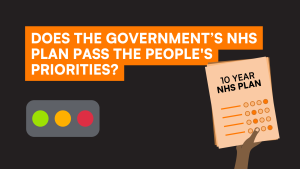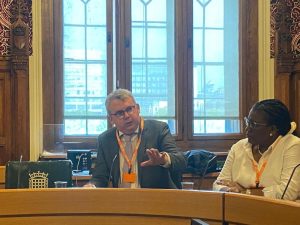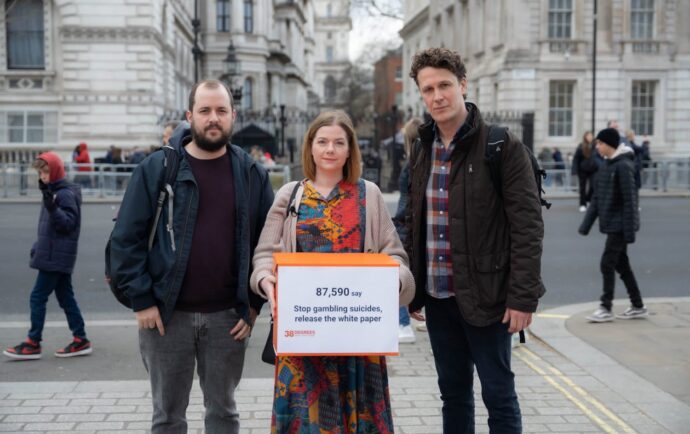
Apr 17th, 2015
Bristol West: where the candidates stand
By Rebecca Falcon
Together, 38 Degrees members in Bristol West came up with questions for the MP candidates – to find out where they stand on the issues that matter most to us.
Now the candidates have got back to us, and what they have to say shows there are clear differences between candidates when it comes to the NHS, housing, tax and the TTIP trade deal.
Here are their answers in full – have a read and see if it helps you make up your mind about who to vote for on May 7th.
Labour Candidate – Thangam Debbonaire
If elected would you:
Q1: Support an increase in overall public spending?
Yes
Yes, as quickly as we can get the economy growing after 5 years of near stagnation through devastating austerity cuts, frozen wages and people stuck in low paid, insecure jobs.
Q2: Support the ratification of TTIP?
Yes
Yes, but with the removal of the NHS and public services, plus the removal of the Investor State Dispute Resolution System (ISDS). Labour is clearly and publicly opposed to including public services and to the ISDS and will not support the TTIP if these remain.
Q3: Support raising the minimum wage to the living wage?
Yes
Q4: Support zero-hours contracts?
No
Labour has committed to ending the use of exploitative zero-hours contracts which bind people to a specific employer without any guarantee of employment. In a very few cases, where there is no such obligation to one specific employer, being contracted for zero-hours is helpful to those who wish to work flexibly – some students have represented this to me as a way of allowing them to combine study with paid work when needed, without having to accept work they can’t manage. Otherwise, zero-hours contracts must go.
Q5: Support a UK ban on fracking?
Yes
Labour has committed to ensuring that fracking only takes place under very limited circumstances, which I believe cannot be met- effectively this should lead to no fracking. I am in favour of evidence-based policy making and also meeting the targets for reducing our carbon-emissions, as Labour introduced. If the safeguards are followed, we should then have evidence which is secure enough to make an informed decision, which, looking at the current state of the evidence, appears to me to point to no-fracking.
Q6: Support raising corporation tax and the top-rate of income tax?
Yes
Labour is going to increase top-rate income tax and not decrease corporation tax.
Q7: Support the introduction of rent controls?
Yes
Yes and this is in Labour’s manifesto.
Q8: Support legislation that bans MPs having paid second jobs and/or sitting on the board of companies?
Yes
I will not take on any other job – being an MP is a full time job.
Q9: Support the abolition of student fees?
No
It would be irresponsible of me to commit us to something when we don’t know how we will pay for it. At the moment, with the economy in the state it is in, Labour has committed to cutting student fees to £6,000 as we know how we can pay for this – and I am also keen to see us focus more on apprenticeships and technical qualifications for the 50% of young people who don’t go to university. If the economy were booming, we could be having a different decision, but we aren’t at that point.
Q10: Support the building of more publicly-owned social housing?
Yes
Yes and Labour has committed to this in our manifesto, along with many other measures to tackle the housing crisis.
Q11: Support private companies running NHS services?
Yes
In some, very specific cases, a private company can supply a particular good or service when a public organisation cannot. For example, drugs, equipment and supplies are not provided by public organisations. However, the Labour party has committed in our manifesto to reversing the Health and Social Care Act which the Tory-LibDem government introduced – stopping the sell of the NHS to any willing provider and returning the NHS to state control and a default towards state run services.
Q12: Support increasing public funding for the NHS?
Yes
Yes and Labour has committed to this.
Q13: Support the re-nationalisation of the railways?
Yes
Yes, providing the term “re-nationalisation” is qualified – I would like public sector organisations to be able to bid for rail contracts when they come up and believe that they would win on quality and best value. This would in effect bring them back to public ownership, but one under one single nationalised body. To do that, we would have to pay the private companies to end their contracts, which wouldn’t be a good use of public money. We can achieve public ownership through public companies winning the contracts when they come up, as they should have been allowed to do for East Coast Mainline.
Q14: Maintain the cuts to Legal Aid?
No
Labour has committed to prioritising reversing the cuts to Legal Aid to victims of domestic violence. I would like us to go further as the economy picks up and I believe that this is the right priority.
Q15: Support making people work for their benefits?
No
Working for benefits is exploitative and undercuts wages. I want people to have a real choice of good jobs and Labour is committed to ensuring this for young people in particular and doing everything we can to get everyone into work who can work, whilst protecting those who can’t.
Q16: Support closing down legal tax avoidance schemes and strengthening sanctions?
Yes
Labour has strong policies to tackle tax avoidance and strengthen sanctions, which are in our manifesto.
Q17: Finally, please list your top 3 policy priorities:
1. Ending child poverty – it is a scandal that in this constituency we have such high levels of inequality, Labour brought in the Child Poverty ACt 2010, committing the country to ending child poverty by 2020. I want to make sure we achieve this.
2. Ending air pollution in Bristol – it’s a fixable problem which is causing respiratory illness and preventable early death.
3. Sorting out the housing crisis in Bristol – We need to protect private tenants from exploitation, build and refurb new homes, remove planning permission from developers who landbank and build social and other affordable housing as a matter of urgency.
Liberal Democrat candidate Stephen Williams
Q1.Support an increase in overall public spending?
Yes/No
The most recent Budget announcements showed that the Liberal Democrats have put the UK’s finances on a steady and fair path of recovery whilst ensuring that nobody is left behind. We will make sure that we do not make any further unnecessary ideological cuts that the Conservatives plan for the next Parliament. However, we will also not jeopardise the recovery with uncalculated spending as Labour plan to do.
We will protect cuts in to vital departments, such as Education, and ensure there is investment where necessary. We are the only party who planning to increase NHS funding in line with the recommendations from the NHS Chief Executive – around £8 billion per year by 2020 – and have laid out how we will fund it.
Q2. Support raising the minimum wage to the living wage?
No
The Liberal Democrats believe it is important to strike a good balance between protecting employees’ rights and making the labour market more flexible. We are tackling low net pay by cutting taxes for people on low and middle incomes so that people keep more of the money they earn. So far, we have taken 2.7 million low paid taxpayers out of income tax altogether, and have given a £700 tax cut to more than 20 million people. From this month, 3.4 million people will pay no income tax at all. As the economy recovers our priority is to protect, and indeed create, jobs. To raise the minimum wage to the living wage level at this point in time would risk the progress we have made in reducing unemployment.
That said, we raised the National Minimum Wage (NMW) in October 2014, with an above inflation rise for the first time since 2008. Because of this, a worker on the adult minimum wage working a 36 hour week, 52 weeks a year now receives £355 a year more in their pay packet. Last month, we announced that the adult NMW will rise in October from £6.50 to £6.70 per hour. According to the current trajectory the minimum wage is due to rise to £8.23 by October 2019. Finally, we are publicly naming and shaming any employers who fail to pay the NMW and have increased the maximum penalty from £5,000 to £20,000 by secondary legislation.
Q3. Stop TTIP?
No
I am not against the Transatlantic Trade and Investment Partnership (TTIP) in principle but I certainly believe it must be negotiated with care. Negotiations are ongoing but if and when the EU is satisfied and reaches an agreement with the US over TTIP, the final agreement will be sent to the 28 EU national parliaments. At this stage the UK Parliament will have the opportunity – in plenty of time – to fully scrutinise TTIP through debates in both Houses. Simply put, if I believe that TTIP will not benefit the UK then I will vote against it.
What I would also like to make clear is that neither the EU nor the US are looking to lower standards through the TTIP process and we have not authorised the EU to agree to anything in TTIP that would do that. The high standards of food and environmental safety we enjoy in the UK are not up for negotiation and there is nothing in TTIP that allows for a reduction or watering-down of the UK’s food, environmental, health or labour standards.
I know also that some people are worried about the potential impact on the NHS. However, As both the Government and the EU Trade Commissioner have made clear, the NHS is excluded from TTIP negotiations. The balance between public and private provision of public services will – quite rightly – continue to remain with national governments regardless of the progress of TTIP.
Q4. Ban zero-hours contracts?
No
Zero-hours contracts are not ‘bad’ in all cases. They can, and do, work for some employers and employees and can provide greater flexibility, which is essential in a dynamic workforce. However, they have often been exploited by employers and that is why in 2014 Business Secretary Vince Cable launched a major review with the goal of enhancing workforce rights. As a result, we banned exclusivity clauses and this will allow employees on zero-hours contracts to have the freedom to find work with more than one employer. Furthermore, a new code of conduct will be developed with businesses to increase awareness of zero-hours contracts and to ensure employers are using them correctly. The Code will outline: when the employer should be using zero-hours contracts; the rights and responsibilities of employee, as well as the employer; and specific guidance on allocating work, notice of hours and cancellation of work.
Q5. Support a UK ban on fracking?
No
I am absolutely committed to a low carbon future where energy is produced through renewable resources. However, this is a gradual process and I believe it is better for gas to be produced in the UK than for us to import it from the Middle East or Russia.
Contrary to the idea that shale exploration will increase our carbon emissions, the independent Committee on Climate Change has concluded that shale gas production in the UK is entirely consistent with our policies to tackle climate change.
Robust laws and protections are already in place to manage the potential risks of fracking. The Infrastructure Act will only strengthen them further. The Liberal Democrat Energy Secretary, Ed Davey has ensured that the UK has the world’s toughest environmental protections on shale, learning lessons from elsewhere such as the US.
It should also be noted that the Liberal Democrats and I are absolutely committed to promoting renewable energy. Whilst in government we have doubled the UK’s share of total energy generated by renewable sources, created the world’s first Green Investment Bank, planted one million trees and increased our lead as the world’s number one generator of offshore wind.
Q6. Support raising corporation tax and the top-rate of income tax?
No
I believe that raising corporation tax or the top rate of income tax could pose a threat to the strong economic growth that we have ensured since entering government. Evidence has shown that raising the top rate of income tax to 50% raises negligible amounts of money for the Treasury and I feel that we must be pragmatic.
That said, I am glad that we have delivered our 2010 manifesto commitment to ring fencing banks to ensure taxpayers are never again expected to underwrite high-risk banking. We have been arguing for this for years, and under this government we have delivered the most radical reform to banking in a generation. We have also electrified the ring-fence to ensure that retail and investment banking remain separate.
We have introduced a £2.5 billion permanent bank levy to both encourage responsible banking and make sure that banks pay their fair share to society. We increased the rate of the levy in January 2013 to compensate for the reduction of corporation tax. Furthermore, under this government the richest pay more than they ever did. The rate is 45p for the highest earners, compared to 40p under Labour.
Q7. Support the introduction of rent controls?
No
The Liberal Democrats believe that rent prices are too high but we do not think that introducing rent controls is the right way to bring down high rents. We believe that building more houses and increasing supply will be more effective at bringing down prices in the long term and providing more choice for renters. Evidence from Britain and around the world shows that rent controls can lead to fewer properties on the market, and higher rents as a result. A price freeze, as proposed by Labour, would bump up rents as landlords raise prices before the freeze takes effect.
Q8. Support legislation that bans MPs having second jobs and/or sitting on the board of companies?
No
If MPs do any paid work outside Parliament it is important that they are registered, transparent and accountable. However, I personally do not think that MPs should be dedicating their time to second jobs. Voters elect their MPs to work for them, and so their principal purpose should be to represent their constituents. As MP for Bristol West I cannot see how I would find the time to have another profession even if I wanted to and I have never had a second job in my 10 years as an MP. That said, I do not think that issue requires legislation. MPs must declare outside interests and if constituents feel that they are doing a poor job as their MP then they can hold them to account.
Q9. Support the abolition of student fees?
No
Liberal Democrats made a pledge before the last election to phase out tuition fees – a pledge we could not deliver given the compromises of coalition government and the state of the public finances. Not being able to keep this pledge was very difficult for me personally and so I did not vote in favour of fee increases. However, we have had just 8% of MPs in the House of Commons during this parliament and so it simply was not possible to phase out fees.
What Liberal Democrats insisted on, however, was to make the whole university fees system fairer so that people can afford to go to university regardless of their background. More students from disadvantaged backgrounds are going to university than ever before and the new system operates as a graduate tax so that those who earn more after graduating pay back more. The reforms have also put around £2 billion into universities, stabilising the sector. Labour’s plan to reduce the cap on fees to £6,000 will only benefit graduates who go on to obtain high paying jobs as under the current system low earning graduates are already exempt from paying back their student loans.
Q10. Support the building of more publicly-owned social housing?
Yes
Liberal Democrats have made affordable housing a priority in government. We have overseen the building of 170,000 new social and affordable homes and have brought 150,000 existing social homes up to a decent living standard in this parliament.
Looking forward, we have set an ambitious goal to build 300,000 homes a year, including in 10 new Garden Cities in areas where homes are needed most. We have also committed to introducing a new “Rent to Own” scheme, which will help working people buy their first home for the same cost as renting. Rent to Own will allow each month’s rental payment to steadily buy you a share in the home, which you will own outright after 30 years.
Q11. Stop private companies running NHS services?
No
I, and my Party, remain fully committed to ensuring that the NHS always remains free at the point of use and that access is based on need. I will always resist any attempts to “privatise” the NHS, but suggestions that the NHS has seen a wide scale privatisation under this government are hyperbolic. Private provision makes up just 6% of the health service, only 1.5% higher than the previous Labour government. We have been very clear that while in some cases we see a role for the private and charitable sectors in the NHS – just as previous governments have – we strongly believe that the NHS should always remain free and be based on need, not ability to pay. It is these principles that form an important part of the fairer society that the Liberal Democrats are seeking to build.
Q12. Support increasing public funding for the NHS?
Yes
The Liberal Democrats are the only party who have a credible plan to secure the funding that is needed for the NHS over the next Parliament. Under Liberal Democrat spending plans, health service funding will be at least £8bn higher per year by 2020, which is higher than any other party. This is not a figure that we have plucked out of the air, it is the amount that Simon Stevens, the NHS England Chief Executive, has said is needed in order to secure the future of the service.
We also want to make sure that NHS money is spent more effectively. If we remain in government we will commission a fundamental review of NHS and social care finances in 2015, before the next Spending Review, in order to assess the pressures on NHS budgets and the scope for efficiencies.
Finally, we will focus additional funding on our priority areas of mental health and prevention. For too long mental health has been neglected in the health service and we want to see ‘parity of esteem’ so that mental and physical health conditions are treated equally.
Q13. Support the re-nationalisation of the railways?
No
The Liberal Democrats opposed the original privatisation of British Rail, as we made clear at the 1992 General Election. We recognised that it would involve significant structural upheaval at that time. However, we do not think a full-scale renationalisation of the railways is practical at this time. That said I believe that public sector operators should be allowed, and encouraged, to bid for rail franchises as they come up for renewal.
Q14. Maintain the cuts to Legal Aid?
Yes/No
As you may be aware, the Government has reviewed the entire legal aid system to ensure that it is sustainable, proportionate and affordable. All three main parties have recognised the need to make savings in the legal aid budget. Our reforms have ensured that legal aid remains available for the most vulnerable cases.
The Government used the Legal Aid, Sentencing and Punishment of Offenders Act 2012 (LASPO) to target legal aid resources at those who are most in need. It was estimated that the changes introduced by the LASPO Act would save an estimated £320 million per year by 2014-15.
However, the Liberal Democrats are clear that the reforms should not go further than is absolutely necessary. For example, we made sure that government plans to remove the right of legal aid defendants in criminal cases to choose their own solicitors were scrapped. Rest assured that we will continue to do what we can to ensure that reforms to the justice system do not go further than needed.
Q15. Support making people work for their benefits?
No
The Liberal Democrats are working towards creating a fair welfare system but, unlike the Conservative Party, we do not want to see benefit claimants targeted and made scapegoats for economic problems.
Q16. Support closing down legal tax avoidance schemes and strengthening sanctions?
Yes
Tackling tax evasion and aggressive tax avoidance is a top priority for the Liberal Democrats and we are fully committed to ensuring that the wealthiest individuals and multinationals in society pay their fair share. It was an issue I pursued with vigour when I was the Liberal Democrat Treasury Spokesman in Parliament from 2010-13.
In government, we have invested nearly £1 billion in HMRC to make sure that everyone pays they tax they owe. As a result of closing over 40 tax loopholes, strengthening enforcement and working with our international partners, we will have secured an additional £100 billion over the course of this parliament in additional tax revenues.
We have proposals to do even more in the next parliament, including raising an extra £6 billion from tackling tax avoidance and evasion as we finish the job of cutting the deficit. We are also introducing a new offence for firms that fail to act to prevent economic crime, as set out in this month’s Budget. This is something that Lib Dem Chief Secretary to the Treasury Danny Alexander has pressed for throughout our time in government.
Q17. Campaign for a Bristol congestion charge?
No
I do not support a London style congestion charge for Bristol. It would be damaging to the city centre economy. Cribbs Causeway shops would gain a major advantage over Broadmead, Cabot Circus and Park Street. However, for many years I have advocated replacing fuel duty with road pricing. This would be a smart tax, charging pence per mile depending on the road being used, time of day and fuel efficiency of the vehicle. Technology now makes this switch possible. I wrote about this idea two years ago in The Green Book (http://green-book.org.uk/)
Q18. Support a coalition government again?
Yes
I feel that coalitions have an important role in democracies, and often offer more electoral legitimacy than single party governments. It is worth noting that Labour’s “landslide” victory in 1997 wielded 43.2% of the national vote – hardly a strong majority. The parties that have formed this Coalition Government between them commanded 59% of the vote.
The current political landscape certainly suggests that coalitions could become a permanent feature in future elections. Of course, with any potential coalition agreement it will be our priority to deliver as much Liberal Democrat policy as possible. I am proud that since entering government in 2010, we have been able to deliver a number of our flagship policies from our last manifesto – the pupil premium, the £10,600 tax-free income tax threshold and the triple lock guarantee for pensions, to name a few.
Green candidate Darren Hall
If elected would you:
Q1: Support an increase in overall public spending?
Yes
We have to invest in the public sector framework that provides the support structure for a modern, civilised society. We must protect and enhance the NHS, ensure public transport is run for the public rather than for profit, reverse the cuts to legal aid to provide equal access to justice and improve social support to those who most need our help.
Q2: Support the ratification of TTIP?
No
I am emphatically against any proposal developed by big business simply in order to be able to achieve greater profits. We must stand by the EU legislation that protects our air and water, and ensure our standards are not driven down by US corporations. I want to see full transparency in the negotiations, at which point I suspect we will all be able to see TTIP for what it really is.
Q3: Support raising the minimum wage to the living wage?
Yes
It is unforgivable that companies can pay their staff below a living wage with the assumption that the state will pick up the tab for the rest. A living wage is a top priority for the Green Party.
Q4: Support zero-hours contracts?
No
I support flexible working but only on the basis of good employment conditions and agreed hours. People need to know whether that are going to be able to pay their rent and put food on the table each month.
Q5: Support a UK ban on fracking?
Yes
We should be concentrating our research and development efforts on renewable energy so that we can leapfrog (the perceived) need for fracking.
Q6: Support raising corporation tax and the top-rate of income tax?
Yes
It is essential that corporations pay a fair share of tax in order to support the society within which they make their profits. “Trickle down” is a failed methodology that has made the gap between rich and poor worse, not better. It is entirely reasonable that those who are most able to are asked to do more to help those who are struggling. Research has clearly shown that in a more equal society, everyone is better off.
Q7: Support the introduction of rent controls?
Yes
The rental market has got completely out of control, with landlords able to treat tenants extremely poorly. The entire system needs an overhaul, but in the meantime, the adoption of an ethical lettings charter along with long term tenancies and agreed rent controls is essential to stabilise the social rental market.
Q8: Support legislation that bans MPs having paid second jobs and/or sitting on the board of companies?
Yes
Frankly £67k is the most money I will have ever earned, so as far as I am concerned it is a full time job requiring full time hours. It is not sufficient just to declare interests, MPs should only have one interest and that is doing a better job of governing the country. My one exception would be the ability to advise not for profit organisations and charities – for free.
Q9: Support the abolition of student fees?
Yes
The Green Party is very clear about removing student fees and I support their stance fully.
Q10: Support the building of more publicly-owned social housing?
Yes
Absolutely. We need Local Authorities to be able to borrow against their assets through a revolving fund, holding onto the property instead of selling it off, and then using the rent to service any loans, and continue to build more. We must also remove “Right to Buy”.
Q11: Support private companies running NHS services?
No
There is absolutely no reason to have a profit motive in the NHS. However, I support the provision of services through not-for-profit social enterprises.
Q12: Support increasing public funding for the NHS?
Yes
This must also include increasing the provision for mental health services, but the key to making the NHS affordable is to understand and deal with the causes of ill-health through better planning of transport and housing, access to green space and increase in health education.
Q13: Support the re-nationalisation of the railways?
Yes
As each of the rail franchises comes up for renegotiation, we have the opportunity to transfer them over to not-for-profit organisations. Public transport should be run in the best interests of users, not shareholders.
Q14: Maintain the cuts to Legal Aid?
No
No, access to justice is a critically important feature of a truly democratic society. Legal aid cuts are fundamentally undermining our world class justice system, and contrary to some believing that it lines the pockets of rich lawyers, those working in legal aid sector are in danger of being forced out of the profession.
Q15: Support making people work for their benefits?
No
We need a fair and transparent system to be able to help people become productive members of society. I believe that the vast majority of people want to work. The key therefore is providing an effective system of support linked to back to work programmes. A living wage for all would be a huge incentive, and is much more effective than a sanctions based approach.
Q16: Support closing down legal tax avoidance schemes and strengthening sanctions?
Yes
We need to start by improving the transparency of the global banking system in order to make it far harder for people to carry out tax avoidance, and create parity across the major economic areas. Companies should pay tax in the countries that they are trading. Where necessary, we need much clearer sanctions, and far more effective prosecutions of those who transgress.
Q17: Finally, please list your top 3 policy priorities
1. Living wage for all
2. Protecting public services through anti-austerity economics
3. Reversing privatisation
4. Tackling climate change and environmental damage.
Independents for Bristol candidate Dawn Parry
If elected would you:
Q1: Support an increase in overall public spending?
Yes
Q2: Support the ratification of TTIP?
No
Q3: Support raising the minimum wage to the living wage?
Yes
Q4: Support zero-hours contracts?
No
Q5: Support a UK ban on fracking?
Yes
Q6: Support raising corporation tax and the top-rate of income tax?
Yes
Q7: Support the introduction of rent controls?
Yes
Q8: Support legislation that bans MPs having paid second jobs and/or sitting on the board of companies?
Yes
Q9: Support the abolition of student fees?
Yes
Q10: Support the building of more publicly-owned social housing?
Yes
Q11: Support private companies running NHS services?
No
Q12: Support increasing public funding for the NHS?
Yes
Q13: Support the re-nationalisation of the railways?
Yes
Q14: Maintain the cuts to Legal Aid?
No
Q15: Support making people work for their benefits?
No
I’d support a voluntary community service but not impose any form of work that should be properly paid hourly as this would enable exploitation of employees.
Q16: Support closing down legal tax avoidance schemes and strengthening sanctions?
Yes
Q17: Finally, please list your top 3 policy priorities
1. NHS
2. Education
3. Housing
Left Unity candidate Stewart Weston
If elected would you:
Q1: Support an increase in overall public spending?
Yes
I would campaign to reverse the cuts in public spending and the austerity package. Embark on an expansion of public spending in pursuit of a policy of full employment. End privatisation of public services health, education etc. reverse outsourcing at all levels scrapping the so-called Private-Public Partnerships and PFI schemes.
Q2: Support the ratification of TTIP?
No
If elected as the Member of Parliament for Bristol West I will oppose the Transatlantic Trade and Investment Partnership between the EU and the USA. TTIP is a threat to the public sector, especially our National Health Service. . Once ratified by the government TTIP would prevent future governments from extending public ownership in effect it would be forbidden to do so. Even finding itself in a similar position to Mexico I reject TTIP and will oppose this pernicious treaty in its entirety. Unfortunately all of Britain’s major parliamentary parties remain committed to signing away our right to govern as the voters see fit. Stopping TTIP will be one of my main priorities, we have to unite all those who oppose the treaty in Britain and internationally. Even if not elected, we must continue to campaign for a Referendum to defeat this Treaty. This changes the way we’re governed and should be decided by plebiscite of the people with the full facts and text placed before all of us.
Q3: Support raising the minimum wage to the living wage?
Yes
I support an immediate increase in the minimum wage to £10 per hour. With an upgrade of the living wage to be linked to the cost of living (RPI) taking additional housing costs in to consideration.
Q4: Support zero-hours contracts?
No
I don’t support zero hour contracts, they should be abolished converting existing ones to proper contracts of employment. Agencies should be stopped from evading European legislation on employment rights
Q5: Support a UK ban on fracking?
Yes
Fracking although currently limited has already caused earth tremors in Manchester, Morcombe and Stoke on Trent. We should be protecting our planet, reducing not increasing the extraction of the earth’s resources.
Q6: Support raising corporation tax and the top-rate of income tax?
Yes
We would raise corporate tax to 40% for large companies, cutting it for small businesses. We would reinstate a 50% tax rate for those on over £75,000 a year while scrapping income tax for those earning less than £20,000.
Q7: Support the introduction of rent controls?
Yes
Left Unity would introduce rent controls, security of tenure and support the creation of tenants’ cooperatives to run estates. Local authorities should be given new powers of inspection and regulation of private rentals to ensure they are up to standard.
Q8: Support legislation that bans MPs having paid second jobs and/or sitting on the board of companies?
Yes
One job should be enough. An MP with time on their hands should consult with their constituents to judge what other policies or causes to take up. An MP caught fiddling their expenses or being paid to ask questions should be sacked immediately and a by election held to replace them within 28 days.
Q9: Support the abolition of student fees?
Yes
We should fund education, free at the point of use, all the way from nursery to university. All students to be guaranteed up to six years free further and higher education to include a living grant.
Q10: Support the building of more publicly-owned social housing?
Yes
Left Unity calls for a massive expansion of the publicly owned and democratically controlled housing sector with social housing allocated according to need. Council house building programmes can be funded by government at very low interest rates. We will end the ‘right to buy’, renovate existing housing stock making it energy-efficient with sustainability at the heart of our programme. A new publicly owned building corporation should be set up employing workers on permanent contracts to implement this. We would support a building programme of 10,000 properties in Bristol and the surrounding area as a start.
Q11: Support private companies running NHS services?
No
Every part of the NHS should be defended as a publicly run, publicly owned system providing free care, market forces have no place in healthcare. We would repeal the Health and Social Care Act to restore the NHS as a publicly delivered, publicly funded and publicly accountable healthcare system.
Q12: Support increasing public funding for the NHS?
Yes
The NHS should be funded through taxation according to social need. We will reverse the decline in wages of health service workers. Stopping the renewal of the Trident missile system frees TWO billion pounds for the NHS. Mental health services need to be expanded and integrated into the broader NHS there should also be a focus on workplace health, public health and social care. Abolish the Private Finance Initiative (PFI) introduced by Labour and cancel the PFI debts. Reduce the Department of Health’s reliance on expensive external management consultants. We need to work towards a single integrated NHS, which would eliminate the internal market (the so-called ‘purchaser/provider split’). The NHS could then use its huge purchasing power to reduce costs of drugs, equipment and supplies. Health research is essential but the private pharmaceutical industry exploits patients and the NHS. Left Unity would restrict its powers, and ultimately replace it with a non-profit system of pharmaceutical production. The money wasted on private profit and bidding processes could be used to expand the total amount of drug research.
Q13: Support the re-nationalisation of the railways?
Yes
We are for public ownership of all essential public utilities including transport, telecoms, and energy and water companies. However we are not for running these in the old top-down way. We support new forms of governance for all these institutions involving representatives of the workforce and local communities. The privatised companies have raised prices faster than inflation, made huge profits and still neglected investment in essential infrastructure. The subsides provided by government should be invested in improving the rail industry no disappearing into private profit
Q14: Maintain the cuts to Legal Aid?
No
The Government, as well as its new Labour predecessor, has made swingeing cuts to legal aid so once again people cannot afford to take legal action over a vast array of issues or to have a quality of criminal defence. We need to reverse the cuts, extend legal aid and make it available to all. How can we have human rights if we don’t have legal rights?
Q15: Support making people work for their benefits?
No
People are already working for benefits. The welfare system has provided massive taxpayer subsidies to low paying employers through Working Tax Credit and to landlords through Housing Benefit. We should stop scapegoating people into deserving and undeserving poor, as most social security recipients are actually in work and the vast majority of people claiming out of work benefits have worked and paid contributions.
Q16: Support closing down legal tax avoidance schemes and strengthening sanctions?
Yes
We need to stamp out tax evasion and avoidance (which are both forms of theft from the UK taxpayer one illegal and one immoral). Implement measures to shore up the domestic tax base, including a general anti-avoidance principle, strengthening HMRC, to protect tax policy making and administration from corporate interference. We will work with governments around the world to promote financial transparency and prevent tax avoidance by pushing for country-by-country reporting, unitary taxation and automatic information exchange. There needs to be a crackdown on the UK’s network of tax haven Crown Dependencies and Overseas Territories which are at the heart of the global tax avoidance industry. Our tax policy will make it clear that every penny of income produced in the UK will be subjected to UK taxation regardless of domesticity of the parent company.
Q17: Finally, please list your top 3 policy priorities
1) National Health Service increase funding
2) House building, more social housing
3) Oppose TTIP so that voters continue to be the masters of their MPs and the country’s destiny not the big corporations
UKIP candidate Paul Turner
If elected would you:
Q1: Support an increase in overall public spending?
Yes
But there is still far too much wasted.
Q2: Support the ratification of TTIP?
No
But I would support a free trade agreement with the USA.
Q3: Support raising the minimum wage to the living wage?
Yes
Q4: Support zero-hours contracts?
Yes
For some workers zero hour contracts work very well and a full contract would be detrimental to them being able to work at all. But we do have some employers that take advantage. So I would support zero hour contracts with much tighter controls.
Q5: Support a UK ban on fracking?
No
Energy will be a major issue for the UK over the next parliament, both supply and cost. Properly regulated fracking could solve both problems, at least for the foreseeable future.
Q6: Support raising corporation tax and the top-rate of income tax?
No
Q7: Support the introduction of rent controls?
Yes
Q8: Support legislation that bans MPs having paid second jobs and/or sitting on the board of companies?
Yes
Being an MP is more than a full time job, can’t see how anyone can do the job properly whilst having other business interests
Q9: Support the abolition of student fees?
No
I feel that student fees should be reduced but not abolished
Q10: Support the building of more publicly-owned social housing?
Yes
Q11: Support private companies running NHS services?
No
Q12: Support increasing public funding for the NHS?
Yes
Again, far too much wastage.
Q13: Support the re-nationalisation of the railways?
Yes
Q14: Maintain the cuts to Legal Aid?
No
The law and justice must be available to all equally
Q15: Support making people work for their benefits?
Yes
Might sound like a bit of a contradiction, working for benefits, but just a few hours a week on projects in the local community, I believe would be of benefit to all concerned.
Q16: Support closing down legal tax avoidance schemes and strengthening sanctions?
Yes
Q17: Finally, please list your top 3 policy priorities
1. NHS
2. Housing
3. Vote on membership of EU
Conservative candidate Claire Hiscott
Q1: Support an increase in overall public
No
We need to manage our public spending to reduce the current huge deficit. However, as the economy continues to grow we will be able to increase spending in a managed way. We currently spend 6% of GDP on debt interest payments, this is half our education budget! When we can eradicate the deficit we can start reducing our debt meaning more money available for public services. It’s a balancing act – I am committed to investment in our public services and getting value for money at the same time as not passing on our debts to our children and grandchildren.
Q2: Support the ratification of TTIP?
Yes
Subject to intense scrutiny and debate! TTIP aims to open up the US market to EU companies including SME’s. It protects entirely our public services including the NHS, contrary to scaremongering by some groupings. We have very similar agreements with Canada and other countries and can be hugely helpful for our export markets and businesses. Before the ratification of TTIP it will be open to scrutiny, debate and revision, by both the Westminster parliament and the EU parliament. I am confident that this scrutiny will ensure the TTIP is right for the UK.
Q3: Support raising the minimum wage to the living wage?
Yes
Moving towards higher take-home pay is the aim of any Conservative government, which is why we have now increased the minimum wage well above inflation and have increased the initial tax threshold to £10,800. We have committed to linking the minimum wage to the tax threshold and removing NI contributions for small business and for employees under 21. This means that the actual take home wage is significantly increased and enables business to increase wages because they are not having to pay the government for employing people.
Q4: Support zero-hours contracts?
Yes
Huge caveat here!!! We have banned exclusive zero-hours contracts and I would be working to stop exploitative actions by irresponsible businesses. In fact one of the first things I would do if elected as your MP would be having a Bristol Business summit to thrash out the issues surrounding flexible working contracts to ensure fairness and ethical treatment of employees. However, many zero-hours contracts are very fair and work well for employees who only want limited and flexible hours of working.
Q5: Support a UK ban on fracking?
No
I would want to see the UK continue to increase our investment in renewable energy and am very pleased at the progress we have made – particularly becoming leaders in offshore wind energy. However, in the transition between fossil and renewable energy use I can see that limited fracking in highly protected situations is going to be necessary. However, I will be supporting and fighting for an increase in renewable energy developments because that is the main long term way forward!
Q6: Support raising corporation tax and the top-rate of income tax?
No
Low corporation tax has meant we have seen global business investment in the UK, which has contributed to our recovery from the worst economic crisis since the war. We now have growth at 2.8%, higher than the rest of the EU and G7. It has enabled the UK to create 1,000 jobs every day during this parliament meaning we have created more jobs than the rest of the EU put together. Increasing the higher rate of tax pushes people into tax avoidance schemes or even leaving the UK completely, meaning the government actually looses money rather than getting more! Cracking down on tax avoidance is of paramount importance and actually realising all the tax that is owed. This government has closed over 40 tax loopholes that the last Labour government ignored for 13years – we are seeing billions more come into the treasury by collecting all that is owed by both individuals and large corporations.
Q7: Support the introduction of rent controls?
No
I support house building to balance supply and demand. When something is in short supply the price goes up! By building more homes we increase choice for both renters and buyers. This controls inflation in the market and prices stabilise. House building is something we are committed to as Conservatives, particularly for the under 40’s looking for first homes. We are committed to increasing both private and council home building to meet the demand of our increasing population – making sure we build the right type of homes, that are sustainable, affordable and energy efficient.
Q8: Support legislation that bans MPs having paid second jobs and/or sitting on the board of companies?
Yes
Yes to stopping sitting on Boards of companies, but some MPs do second jobs that require limited time. Some are lecturers, some are GPs etc. This can keep MPs in touch with the real world – however I would say that being a great constituency MP is more than a full time job, and I would certainly only have ONE job and that would be working flat-out for Bristol West!
Q9: Support the abolition of student fees?
No
In the current economic situation we have to be realistic – public services need investment at the same time as reducing the deficit. The money only goes so far, sadly. The current fee scheme means that no one pays up front, only when they are in good job earning over £21k. Labour want to change this which would actually mean lower paid graduates would have to pay more back – which doesn’t seem fair to me at all.
Q10: Support the building of more publicly-owned social housing?
Yes
We are committed to building hundreds of thousands of new homes in the public sector, alongside increased house building in all sectors.
Q11: Support private companies running NHS services?
Yes
GP’s, dentists, opticians and pharmacies have ALWAYS been private companies with contracts to the NHS and I see no reason to change this. Some other services such as cleaning, maintenance and some specific treatment services have effective been contracted out. However, commissioners must ensure that quality is the priority and that contracts are fair. We have seen the bad use of PFI contracts and private treatment centres contracted by the last government – this is costing the NHS billions every year and must be stopped.
Q12: Support increasing public funding for the NHS?
Yes
As someone who has worked in the NHS for 25 years I will always fight for the best quality healthcare for everyone that needs it. Conservatives have committed to £8billion extra for the NHS – in line with NHS England’s own five year plan recommendations. A strong economy means a strong NHS, and I will always be committed to its founding value of being free at the point of use.
Q13: Support the re-nationalisation of the railways?
Respondent skipped this question
Q14: Maintain the cuts to Legal Aid?
No
Some review of the system is necessary to ensure the most vulnerable continue to be supported – however, often it is understanding entitlements and making the system easier to navigate. However I do support many of the revisions to legal aid, which has reduced spurious claims. we need to ensure fairness in the system, and we still have one of the most generous Legal Aid schemes in the world.
Q15: Support making people work for their benefits
Respondent skipped this question
Q16: Support closing down legal tax avoidance schemes and strengthening sanctions?
Yes
Q17: Finally, please list your top 3 policy priorities
1. Investment in the NHS
2. Balancing the economy to reduce the deficit
3. House building


















